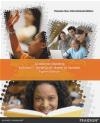Academic Reading
Brette McWhorter Sember, Kathleen McWhorter
Academic Reading
Brette McWhorter Sember, Kathleen McWhorter
- Producent: Pearson
- Rok produkcji: 2013
- ISBN: 9781292023618
- Ilość stron: 444
- Oprawa: Miękka
Niedostępna
Opis: Academic Reading - Brette McWhorter Sember, Kathleen McWhorter
Academic Reading: College Major and Career Applications focuses on developing essential reading skills while showing students how to adapt them to specific academic disciplines and career fields. Kathleen McWhorter offers a unique, contextualized approach that focuses on academic reading skills and also motivates students towards a particular area of interest or field of study. Readers learn important comprehension, vocabulary, and critical thinking skills, as well as how to adapt these skills to study specific academic disciplines. While doing so, they also learn what each discipline involves and explore the available career paths. As an end result, Academic Reading teaches essential reading skills while opening up new academic and career possibilities. This edition of Academic Reading is supported by an enhanced MyReadingLab course, which offers text-specific exercises within the Learning Path, all of which feed into the MyReadingLab Gradebook.PART ONE Fundamental Reading Strategies CHAPTER 2 Fundamental Comprehension Skills Finding the Main Idea Identifying Topic Sentences Finding an Implied Main Idea Recognizing Primary and Secondary Details Adjusting Your Rate to Meet Comprehension Demands Self-Test Summary SOCIOLOGY READING: Diversity in U.S. Families CHAPTER 3 Essential Vocabulary Skills Techniques for Vocabulary Development Using a System for Learning New Vocabulary Using Context Clues Learning Word Parts: The Multiplier Effect Using Word Mapping to Expand Your Vocabulary Learning Specialized and Scientific Vocabulary Self-Test Summary Interpersonal Communication Reading: Principles of Verbal Messages PART TWO Critical Reading Strategies CHAPTER 4 Evaluating the Author's Message Make Inferences as You Read Assessing the Author's Qualifications Distinguishing Between Fact and Opinion Identifying the Author's Purpose Evaluating the Data and Evidence Analyzing the Writer's Tone Annotating as You Read Synthesizing Your Ideas Self-Test Summary EDUCATION READING: His Name Is Michael CHAPTER 5 Evaluating the Author's Techniques Does the Writer Use Connotative Language? Does the Writer Use Figurative Language? Is the Author Fair or Biased? What Isn't the Author Telling Me? Does the Author Make and Support Generalizations? What Assumptions Is the Author Making? Does the Author Use Manipulative Language? Self-Test Summary Public Relations READING: Women Mobilize Against Scruffy-Faced Men CHAPTER 6 Reading and Evaluat ing Arguments What Is an Argument? Parts of an Argument Inductive and Deductive Arguments Strategies for Reading an Argument Strategies for Evaluating Arguments Errors in Logical Reasoning Self-Test Summary PAIRED TECHNOLOGY READING: Should Online Sites Ban Postings by Groups the Government Identifies as Terrorists (Pro) Should Online Sites Ban Postings by Groups the Government Identifies as Terrorists (Con) PART THREE Academic Reading Strategies CHAPTER 7 Patterns of Academic Thought Patterns: A Focus for Reading The Definition Pattern The Classification Pattern The Order of Sequence Pattern The Cause and Effect Pattern The Comparison and Contrast Pattern The Listing/Enumeration Pattern Mixed Patterns Other Useful Patterns of Organization Self-Test Summary HISTORY READING: The Rise of African Americans CHAPTER 8 Reading and Evaluating Graphics and Online Sources How to Read Graphics Types of Graphics Understanding Visuals Evaluating Internet Sources Avoiding Plagiarism Self-Test Summary BIOLOGY READING: Biodiversity Loss and Species Extinction CHAPTER 9 Using Writing to Learn Writing to Assess and Strengthen Comprehension Highlighting and Annotating Textbooks Note Taking to Organize Ideas Mapping to Show Relationships Summarizing to Condense Ideas Self-Test Summary CRIMINAL JUSTICE READING: New Ways of Administering Justice and Punishment PART FOUR Strategies for Specific Disciplines CHAPTER 10 Reading in the Social Sciences What Are the Social Sciences? Should You Major in a Social Science? Tips for Studying Social Science-Even if You Are Not a Major Social Science Textbooks: The Basics Specialized Reading Techniques Thought Patterns in the Social Sciences Adapting Your Study Techniques Test-Taking Tips: Preparing for Exams in the Social Sciences Self-Test Summary Psychology Reading: Persuasion or "Brainwashing"? The Case of Suicide Bombers CHAPTER 11 Reading in Business What Are the Business Disciplines? Should You Major in Business? Tips for Studying Business-Even if You Are Not a Major Current Hot Topics in Business Specialized Reading Techniques Thought Patterns in Business Adapting Your Study Techniques Test-Taking Tips: Objective Exams Self-Test Summary MARKETING READING: New Advertising Techniques CHAPTER 12 Reading in the Liberal Arts, Humanities, and Education What Are the Liberal Arts and Humanities? Should You Major in the Liberal Arts? Tips for Studying the Liberal Arts-Even if You Are Not a Major Advice for Education Majors Reading and Analyzing Literature The Visual Arts: Expression Without Words Reading Criticism Thought Patterns in the Liberal Arts and Humanities Learning Strategies for Liberal Arts and Humanities Courses Test-Taking Tips: Preparing for Exams in the Liberal Arts and Humanities Self-Test Summary LITERATURE READING: Leaves CHAPTER 13 Reading in Mathematics What Is Mathematics? Should You Major in Mathematics? Tips for Studying Mathematics-Even if You Are Not a Major Reading Mathematics Textbooks Thought Patterns in Mathematics Studying Mathematics Test-Taking Tips: Preparing for Exams in Mathematics Self-Test Summary Mathemat ics Reading: Problem Solving CHAPTER 14 Reading in the Life and Physical Sciences What Are the Life and Physical Sciences? Should You Major in the Life and Physical Sciences? Tips for Studying the Life and Physical Sciences-Even if You Are Not a Major Specialized Reading Techniques Thought Patterns in the Life and Physical Sciences Adapting Your Study Techniques If You Are Having Difficulty Test-Taking Tips: Preparing for Exams in the Life and Physical Sciences Self-Test Summary BIOLOGY READING: The Promise of Stem Cell Research CHAPTER 15 Reading in Technical and Applied Fields What Are the Technical and Applied Fields? Should You Major in a Technical/Applied Field? Should You Major in an Allied Health Field? Tips for Being a Successful Allied Health Major Reading Technical Material Thought Patterns in Technical Fields Study Techniques for Technical Courses Test-Taking Tips: Preparing for Exams in Technical Courses Self-Test Summary NURSING READING: Telehealth: Promise or Peril? ONLINE CHAPTER Reading Research, Reference, and Collateral Assignments Reading Research Materials Alternative Reading Strategies Documentation and Note Taking Reading Collateral Assignments Evaluating Sources Synthesizing and Comparing Sources Self-Test Summary Paired Readings Plagiarism Plagiarism Additional Practice Credits Index
Producent:
GPSR Pearson Central Europe Sp. z o.o.
ul. Szamocka 8
01-748 Warszawa (PL)
tel: 459 596 060
email: [email protected]
Szczegóły: Academic Reading - Brette McWhorter Sember, Kathleen McWhorter
Tytuł: Academic Reading
Autor: Brette McWhorter Sember, Kathleen McWhorter
Producent: Pearson
ISBN: 9781292023618
Rok produkcji: 2013
Ilość stron: 444
Oprawa: Miękka
Waga: 0.95 kg


















